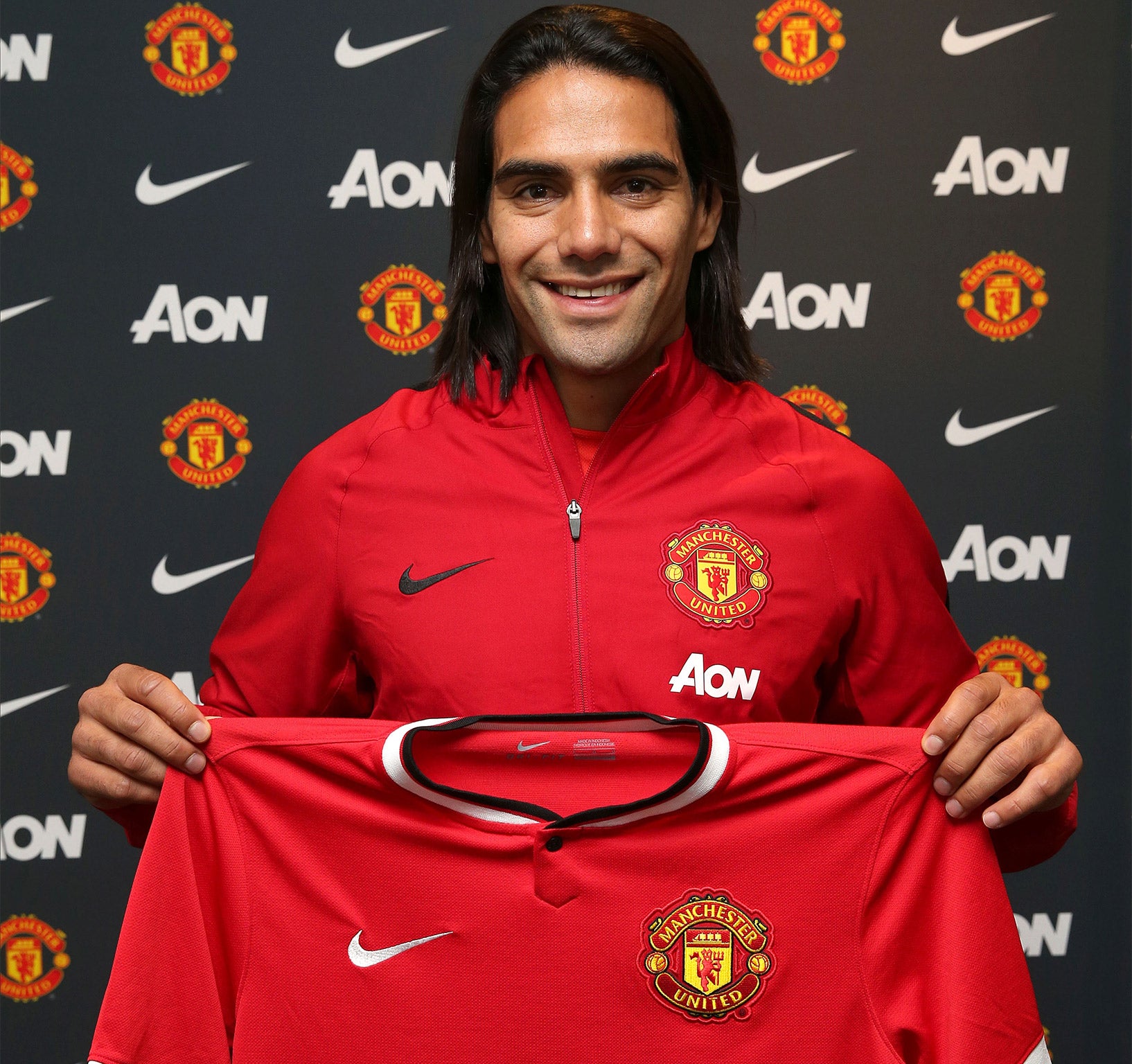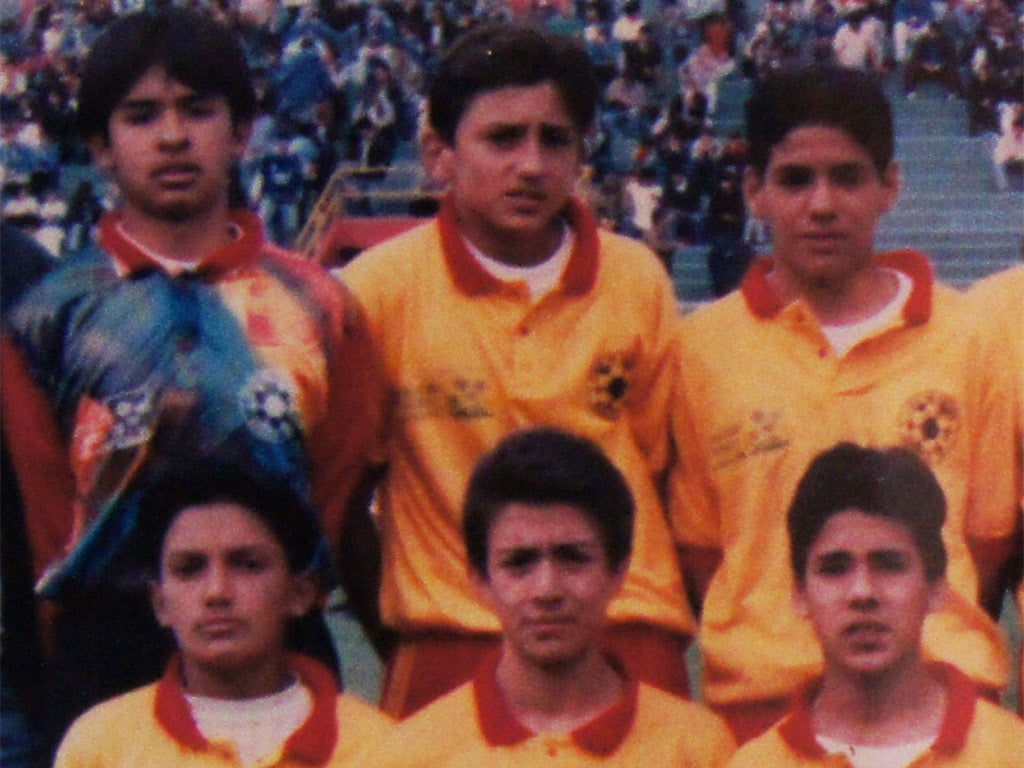Radamel Falcao's journey from teenage debutant to Manchester United's star signing
He could have played baseball, but the Colombian is now one of the world's most sought after strikers

In the Colombian city of Santa Marta on the Caribbean coast, a statue towers by the entrance of the Eduardo Santos stadium. Wild coils of yellow hair, arms flailing and eyes fixed on the ball, the 22-foot bronze work portrays one of the country’s most recognizable faces: that of Carlos “El Pibe” Valderrama, the languid genius and heartbeat of Colombia’s golden team of the 1990s.
Considered the greatest player to have worn his country’s yellow jersey, Valderrama brought joy to a nation struggling through the violent years of Colombia’s drug wars. For many Colombians, nobody will ever touch “El Pibe’s” iconic status. But in recent years a new star has started to shine. He is also from Santa Marta.
Born in 1986, Radamel Falcao Garcia Zarate was rooted in football. He was named after the Brazilian who shone as part of the 1982 Selecao, and his father – also called Radamel – was a professional who had played centre-back for Colombian side Santa Fe. By the time Radamel was born, however, his father’s career was on the wane. With Radamel aged just four, the family set up a new life over the Venezuelan border.
For the next five years the young Radamel was whisked around as his dad chased the dying days of his career in a country not known for its football. It was baseball that ruled and so it was inevitable that the youngster would turn to bat and ball. After a painful incident involving a bloody nose playing football, Falcao took up baseball and showed promise. “He was very good,” his father recalls. “His baseball coach once begged me to let him continue playing because he was so quick in getting to the bases.”
But Falcao’s dalliance with baseball soon ended when, in 1995, his family returned to Colombia. Back in Bogota he joined a local side where he would train after school. His eye for goal caught the attention of a friend of his father.
Argentine Silvano Espindola was a devout Christian and had played with Falcao Snr at Colombian side Union Magdalena. Now a businessman and spiritual guide, he channelled his post-playing career energies into a football school with a religious bent; players weren’t just picked for their abilities but for their personal qualities too. It would be the turning point in the youngster’s life.
“That was my dad’s main goal when I was a kid: to turn me into a good man,” Falcao later told Colombian journalist Mauricio Silva. “Everyone who was involved in that school saw their lives totally transformed.”

It was Espindola who convinced the youngster to turn his back on Bogota’s biggest clubs, Santa Fe and Millonarios, to join his Fair Play academy. At just 13 years old, his big moment had arrived and he joined the squad who were in the Colombian Second Division.
By August 1999 he believed the fledgling star was ready to play. “Silvano and I made the decision a few days before our league game with Pereira,” then Lanceros manager Hernan Pacheco tells me after a football practice with young kids in Bogota. “We’d both seen how good he was, and his ability of doing something completely different stood out.”
On 28 August 1999, with just 20 minutes left in the team’s match, Falcao made history as the youngest player to play in Colombian football. “He was a bit shy and the other players really didn’t like what I did. Imagine having to come off for a 13-year-old child? Both my guys and the opposition told me to stop messing around and treat football professionally,” Pacheco recalls.
Despite the initial hostilities, his team-mates were soon won over. “They were all impressed after that game. We knew he was something special.”
Falcao would go on to become the youngest player to score in the Colombian League before Espindola orchestrated a move to River Plate a year later. It was here that his precocious talent was honed and toughened. “When he went to Argentina he stuck it out despite being left alone a lot of the time. Most Colombians there came home missing their mums but not him,” his father later said.
The teenager worked his way through the youth ranks, and later took a journalism degree at the University of Palermo. He made his debut four years after signing for River, having acquired a nickname due to his style of play. “You played like a tiger today,” team-mate Gonzalo Luduena told him in the changing rooms after an Under-15s game.
In 2005 his career took off with seven goals in as many games, but a cruciate injury ruled him out for a year. Not for the last time Falcao would turn to God and his faith to help him through.
By 2007 he was back to his best and he made his international debut shortly before hard-up River sold him to Porto for $5m (£3m). Over the next three seasons he scored 72 goals in 87 games, then won the 2011 Europa League and was on his way to becoming one of Europe’s best strikers. Now at a major club, the only worry will be to keep him fit. But if Louis van Gaal succeeds, then one day Santa Marta may boast two statues celebrating Colombia’s famous footballing sons.
Join our commenting forum
Join thought-provoking conversations, follow other Independent readers and see their replies
Comments